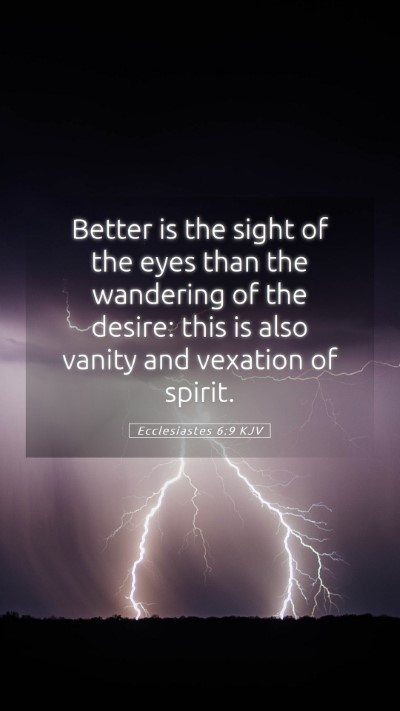Old Testament
Genesis Exodus Leviticus Numbers Deuteronomy Joshua Judges Ruth 1 Samuel 2 Samuel 1 Kings 2 Kings 1 Chronicles 2 Chronicles Ezra Nehemiah Esther Job Psalms Proverbs Ecclesiastes Song of Solomon Isaiah Jeremiah Lamentations Ezekiel Daniel Hosea Joel Amos Obadiah Jonah Micah Nahum Habakkuk Zephaniah Haggai Zechariah MalachiEcclesiastes 6:9 Meaning
What is the meaning of Ecclesiastes 6:9?
Better is the sight of the eyes than the wandering of the desire: this is also vanity and vexation of spirit.
Ecclesiastes 6:9 Bible Verse Meaning
Understanding Ecclesiastes 6:9
The verse Ecclesiastes 6:9 states, "Better is the sight of the eyes than the wandering of the desire: this is also vanity and vexation of spirit." This passage offers rich insight into the human experience, contrasting the tangible with the intangible desires that often lead to dissatisfaction.
Meaning of Bible Verses
This verse highlights the value of appreciating what one has rather than longing for what is beyond reach. Public domain commentaries, such as those by Matthew Henry, emphasize that the "sight of the eyes" symbolizes contentment in present realities, while "the wandering of desire" reflects a restless spirit chasing after fleeting pleasures.
Bible Verse Interpretations
- Matthew Henry's Commentary: Suggests that this verse serves as a reminder that true satisfaction comes from being present and grateful for what one possesses, rather than being consumed by unattainable aspirations.
- Albert Barnes' Notes: Points out that human desire is often insatiable, and thus, what one sees and has is more valuable than endless longing, which leads to spiritual vexation.
- Adam Clarke's Commentary: In his analysis, Clarke notes that the verse encapsulates a key theme of Ecclesiastes: the futility of pursuing desires that do not lead to genuine fulfillment.
Bible Verse Understanding
The essence of Ecclesiastes 6:9 revolves around the philosophical reflections on life, revealing its transient nature. It calls for discernment in appreciating the present moment, which resonates with biblical teachings on contentment (Philippians 4:11-13).
Bible Verse Explanations
This scripture provides a perspective on the nature of human desires. While aspirations can motivate individuals, unchecked longing can result in a cycle of dissatisfaction. The wisdom of the author, traditionally ascribed to King Solomon, illuminates the futility of life lived in pursuit of ephemeral joys.
Scripture Analysis
Ecclesiastes is a profound book that reflects on existential questions. Within the context of its broader themes, Ecclesiastes 6:9 serves as a poignant observation on the nature of fulfillment. The fleeting pleasures of this world often lead to a sense of "vanity," suggesting a deeper spiritual void.
Cross References
- Philippians 4:11-13: Discusses contentment and the empowerment found in Christ.
- Proverbs 14:12: States that there is a way that seems right to a man, but its end is the way of death.
- Matthew 6:25-34: Encourages reliance on God for needs rather than anxious pursuits.
Bible Study Insights
When engaging in Bible study, Ecclesiastes 6:9 invites reflection on personal desires and ambitions. Questions to consider might include: What desires distract me from appreciating the present? How can I cultivate contentment? These inquiries can lead to a more grounded faith and contentment in daily life.
Applying Bible Verses to Daily Life
In practical terms, Ecclesiastes 6:9 suggests a shift in mindset towards gratitude. Lists, such as daily reflections on what one is thankful for, can help mitigate the wandering desire that often disrupts peace. Incorporating meditation on this verse in one's daily routine can lead to a more fulfilled life grounded in biblical understanding.


